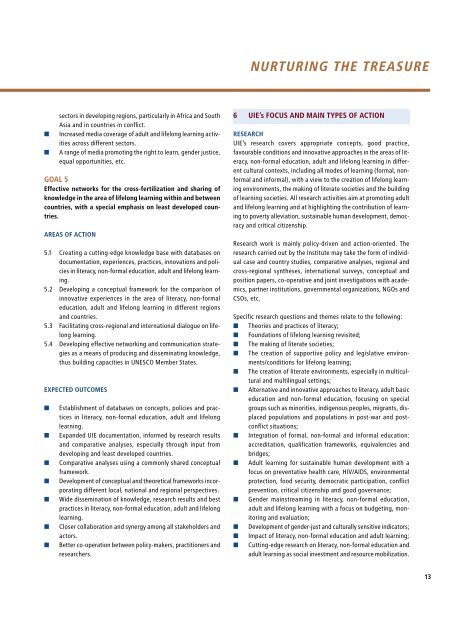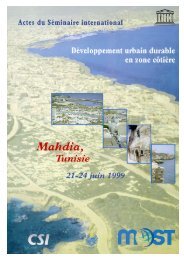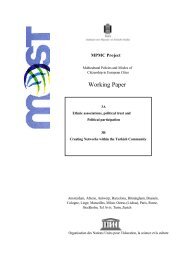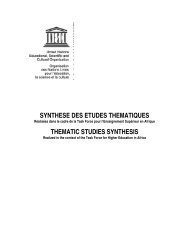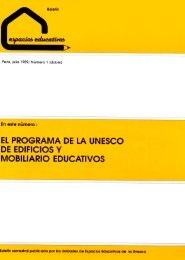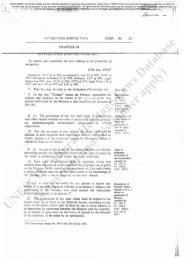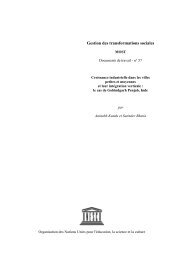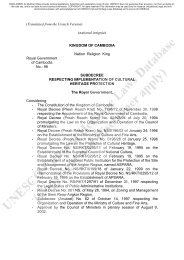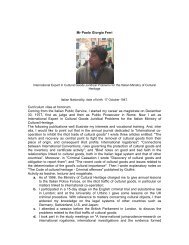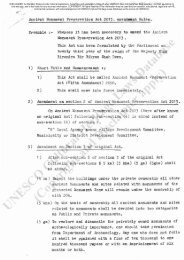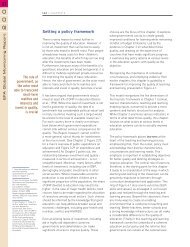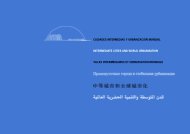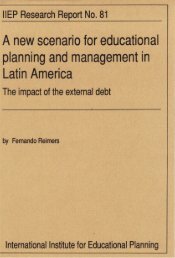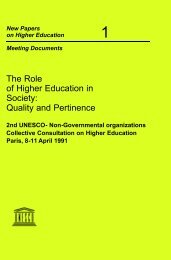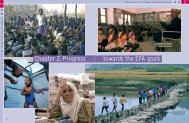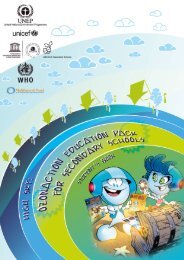NURTURING THE TREASURE NURTURING THE ... - Unesco
NURTURING THE TREASURE NURTURING THE ... - Unesco
NURTURING THE TREASURE NURTURING THE ... - Unesco
Create successful ePaper yourself
Turn your PDF publications into a flip-book with our unique Google optimized e-Paper software.
<strong>NURTURING</strong> <strong>THE</strong> <strong>TREASURE</strong><br />
■<br />
■<br />
sectors in developing regions, particularly in Africa and South<br />
Asia and in countries in conflict.<br />
Increased media coverage of adult and lifelong learning activities<br />
across different sectors.<br />
A range of media promoting the right to learn, gender justice,<br />
equal opportunities, etc.<br />
GOAL 5<br />
Effective networks for the cross-fertilization and sharing of<br />
knowledge in the area of lifelong learning within and between<br />
countries, with a special emphasis on least developed countries.<br />
AREAS OF ACTION<br />
5.1 Creating a cutting-edge knowledge base with databases on<br />
documentation, experiences, practices, innovations and policies<br />
in literacy, non-formal education, adult and lifelong learning.<br />
5.2 Developing a conceptual framework for the comparison of<br />
innovative experiences in the area of literacy, non-formal<br />
education, adult and lifelong learning in different regions<br />
and countries.<br />
5.3 Facilitating cross-regional and international dialogue on lifelong<br />
learning.<br />
5.4 Developing effective networking and communication strategies<br />
as a means of producing and disseminating knowledge,<br />
thus building capacities in UNESCO Member States.<br />
EXPECTED OUTCOMES<br />
■<br />
■<br />
■<br />
■<br />
■<br />
■<br />
■<br />
Establishment of databases on concepts, policies and practices<br />
in literacy, non-formal education, adult and lifelong<br />
learning.<br />
Expanded UIE documentation, informed by research results<br />
and comparative analyses, especially through input from<br />
developing and least developed countries.<br />
Comparative analyses using a commonly shared conceptual<br />
framework.<br />
Development of conceptual and theoretical frameworks incorporating<br />
different local, national and regional perspectives.<br />
Wide dissemination of knowledge, research results and best<br />
practices in literacy, non-formal education, adult and lifelong<br />
learning.<br />
Closer collaboration and synergy among all stakeholders and<br />
actors.<br />
Better co-operation between policy-makers, practitioners and<br />
researchers.<br />
6 UIE’s FOCUS AND MAIN TYPES OF ACTION<br />
RESEARCH<br />
UIE’s research covers appropriate concepts, good practice,<br />
favourable conditions and innovative approaches in the areas of literacy,<br />
non-formal education, adult and lifelong learning in different<br />
cultural contexts, including all modes of learning (formal, nonformal<br />
and informal), with a view to the creation of lifelong learning<br />
environments, the making of literate societies and the building<br />
of learning societies. All research activities aim at promoting adult<br />
and lifelong learning and at highlighting the contribution of learning<br />
to poverty alleviation, sustainable human development, democracy<br />
and critical citizenship.<br />
Research work is mainly policy-driven and action-oriented. The<br />
research carried out by the Institute may take the form of individual<br />
case and country studies, comparative analyses, regional and<br />
cross-regional syntheses, international surveys, conceptual and<br />
position papers, co-operative and joint investigations with academics,<br />
partner institutions, governmental organizations, NGOs and<br />
CSOs, etc.<br />
Specific research questions and themes relate to the following:<br />
■ Theories and practices of literacy;<br />
■ Foundations of lifelong learning revisited;<br />
■ The making of literate societies;<br />
■ The creation of supportive policy and legislative environments/conditions<br />
for lifelong learning;<br />
■ The creation of literate environments, especially in multicultural<br />
and multilingual settings;<br />
■ Alternative and innovative approaches to literacy, adult basic<br />
education and non-formal education, focusing on special<br />
groups such as minorities, indigenous peoples, migrants, displaced<br />
populations and populations in post-war and postconflict<br />
situations;<br />
■ Integration of formal, non-formal and informal education:<br />
accreditation, qualification frameworks, equivalencies and<br />
bridges;<br />
■ Adult learning for sustainable human development with a<br />
focus on preventative health care, HIV/AIDS, environmental<br />
protection, food security, democratic participation, conflict<br />
prevention, critical citizenship and good governance;<br />
■ Gender mainstreaming in literacy, non-formal education,<br />
adult and lifelong learning with a focus on budgeting, monitoring<br />
and evaluation;<br />
■ Development of gender-just and culturally sensitive indicators;<br />
■ Impact of literacy, non-formal education and adult learning;<br />
■ Cutting-edge research on literacy, non-formal education and<br />
adult learning as social investment and resource mobilization.<br />
13


